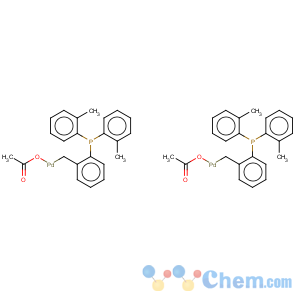Title: Herrmann-Beller Catalyst
CAS Registry Number: 172418-32-5
CAS Name: Bis[m-(acetato-k
O:k
O¢)]bis[[2-[bis(2-methylphenyl)phosphino-k
P]phenyl]methyl-k
C]dipalladium stereoisomer
Synonyms: trans-di(m-acetato)bis[
o-(di-
o-tolylphosphino)benzyl]dipalladium(II); Herrmann's palladacycle
Molecular Formula: C46H46O4P2Pd2
Molecular Weight: 937.64
Percent Composition: C 58.92%, H 4.94%, O 6.83%, P 6.61%, Pd 22.70%
Literature References: Highly efficient palladacycle catalyst; exists in a monomer/dimer equilibrium in soln. Prepn: M. Beller
et al., DE 4421753 (1995 to Hoechst);
eidem,
US 5831107 (1998 to Aventis); and catalytic applications: W. A. Herrmann
et al., Angew. Chem. Int. Ed. 34, 1844 (1995);
eidem,
Chem. Eur. J. 3, 1357 (1997); W. A. Herrmann
et al., J. Chem. Educ. 77, 92 (2000). EXAFS characterization: S. G. Fiddy
et al., Chem. Commun. 2003, 2682. Catalysis mechanism in the Heck reaction: V. P. W. B?hm, W. A. Herrmann,
Chem. Eur. J. 7, 4191 (2001). Review of catalytic applications: A. Speicher
et al., J. Prakt. Chem. 341, 605-608 (1999).
Properties: Yellow crystals from toluene/hexane or CH2Cl2/hexane, mp 229-231° (dec). Air stable; thermally stable; becomes catalytically active at ~80°.
Melting point: mp 229-231° (dec)
Use: Homogeneous catalyst in carbon-carbon bond forming reactions such as the Heck and Suzuki reactions.

